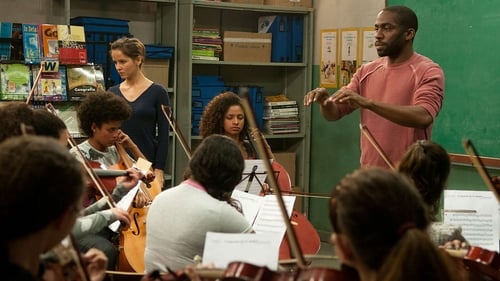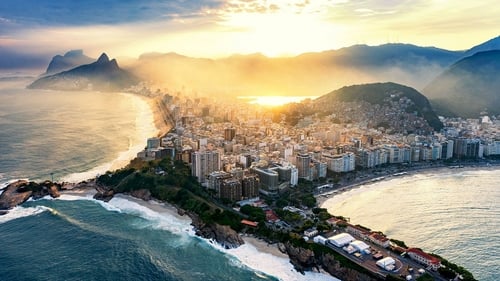Fuga da Rocinha (2016)
Género : Drama, Crimen
Tiempo de ejecución : 1H 50M
Director : Antônio Junior
Sinopsis
Anderson (Andrey Lopes) is a high-class youth living in Copacabana, and Eliza (Maiara Queiroz), a resident of Rocinha,the largest favela in Brazil. The two start a romance, but the first time Anderson meets the community in which she lives, he witnesses a murder.

Laertes (Lázaro Ramos), un violinista de gran talento que ha sido rechazado en la prestigiosa Orquesta Sinfónica del Estado, comienza a dar clases de música a adolescentes de una escuela pública en Heliópolis, un barrio de una zona deprimida de São Paulo. Esta experiencia cambiará su vida y la de sus alumnos... Inspirada en la verdadera historia del maestro brasileño Silvio Bacarelli, que en los años 90 consiguió estimular la inclusión social y cultural de los jóvenes de una de las favelas más grandes de São Paulo.

Two children flee together with a grown up from a slum in Rio because this older person has had problems with the local drug lord. They end up in the house where a rich American lives with his daughter.

The drama recounts the need for dialogue and attention on raising children through their characters: three mothers and their children. Marcia (Dani Tavares) A high-class mother and married, who always had everything and provides the same for your child, Angela (Ruth Cherem) a single mother of middle class, which makes everything so that your daughter does not her make the same mistakes of the past and Deborah (Val Ribeiro Valquiria Ribeiro) a low-class mother abandoned by her husband, who struggles to raise your child the best possible way. What do these women have in common is the love for their children that make it able to do everything for them, but sometimes it takes more to save the family loose links. It takes great faith.

Rio de Janeiro es una ciudad en expansion. De sus casi 12 millones de habitantes, se calcula que el 20% de la poblacion vive en las mas de 600 favelas o barrios de chabolas. La mayoria de ellas estan controladas por narcotraficantes o paramilitares armados hasta los dientes que nunca antes habian sido filmados sin disfraces o caretas

Estrenamos en exclusiva en España una de las películas imprescindibles para entender la actualidad en Brasil. Una obra que analiza una música pornográfica y explícita, por las letras de sus temas y los movimientos de baile. Una música dominada por hombres, mayoritariamente gángsters, en la que la mujer queda reducida a objeto de deseo. Un viaje al interior del mundo de las favelas y su música funk.

Documentary about the foreign tourism in Rocinha, the biggest Latin America's favela, which receives about 3.000 foreign tourists per month. They come to Rocinha looking for the most varied aspects, from the poorness to the violence, from the geography to the architecture, from the viewing to the atmosphere, from the curiosity to the welfarism.

The Favela Pacification Program was launched in 2008 to reduce crime and drug trafficking in Rio de Janeiro, Brazil. In April 2015 however, police shot and killed 10-year old Eduardo in Complexo do Alemão, causing uproar in that community. Alemão and other pacified communities began to realise that the program had become the very thing it was designed to destroy. Taking place in the build to the 2016 Olympic Games, this is the side of Rio that you have never seen before.

A boxer in Rio's favelas opens a club to help keep kids out of the burgeoning drug trade.

Between 2011 and 2014, the documentary investigated the changes in Rio de Janeiro on behalf of mega-events: UPPs in slums, forced evictions, public spaces privatization and popular uprisings.

Documentary about the singer Bezerra da Silva and the relation with his composers.

The short documentary ‘Complexos‘ features intimate and emotional views on how residents of favelas in Rio de Janeiro use media and arts to raise their voices and act for justice, dignity and respect. ‘Complexos’ is part of a collaborative process between the Finland-based Anti-Racism Media activism Alliance (ARMA Alliance) and the favela-based audiovisual collective Cafuné na Laje.

The women of the first Garífuna community in Honduras work hard for the future of their daughters. Surrounded by a dazzling landscape, they celebrate their identity and the importance of maternal figures.

No Rio de Janeiro, a 13 km do Cristo Redentor, dois portugueses aventuraram-se na mais temida favela do Brasil, onde moram mais de 300.000 pessoas - o Complexo do Alemão. Em 2007, no período de maior tensão e violência no Rio de Janeiro, viveram a maior operação policial já realizada no estado, sentiram na pele como é a vida de um simples morador. O filme retrata este perigoso e complexo mundo, um universo paralelo inserido dentro de uma ordem maior, um mundo à parte, que segue uma ordem diferente da ordem global.

Documentary addressing the composer Cartola and the transformations that took place in Morro Carioca and in Samba during his life. Founder of the Escola de Samba Estação Primeira de Mangueira, Cartola has his life and his music marked by his community and his School, far from the city His school, created as a playful and expressive center for the mangueirense, has now become a point of tourist attraction. This made work possible for the inhabitants of the hill, but it transformed the spirit of samba and its aesthetics.








